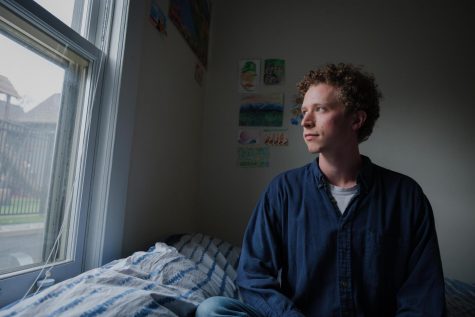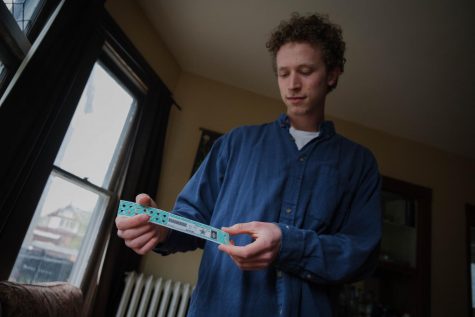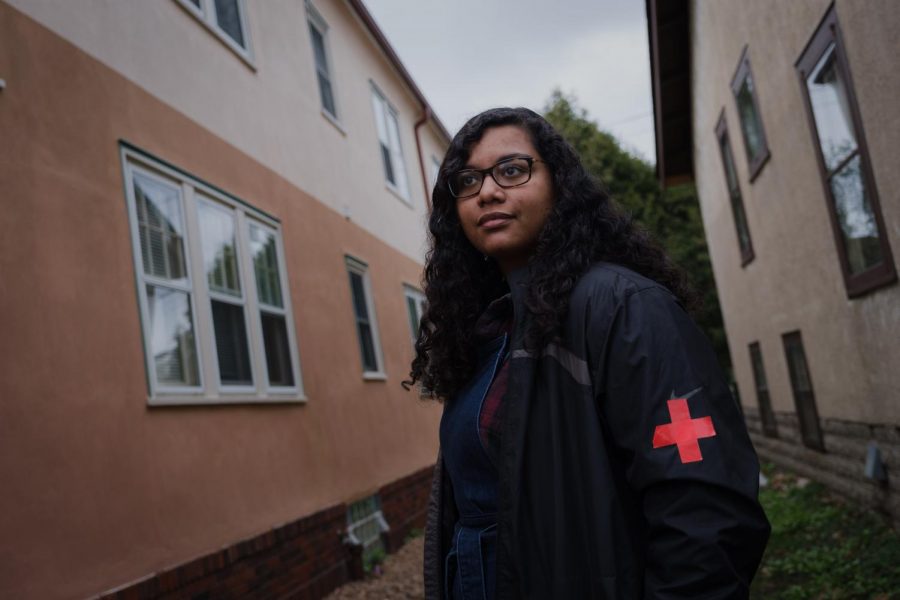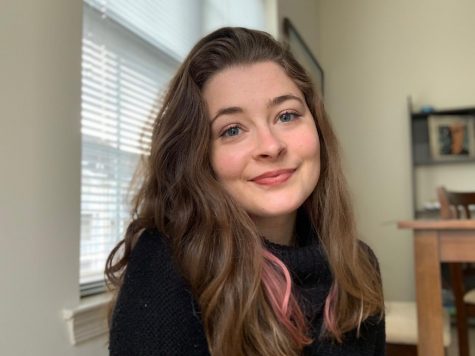Macalester student medics arrested at Brooklyn Center protest
Autumn Campbell ’21 was one of two Macalester students arrested in Brooklyn Center on Friday April 16. She was working as a medic at the time. Photo by Kori Suzuki ’21.
April 22, 2021
As officers began making mass arrests of Brooklyn Center protesters at around 10 p.m. on Friday, April 16, Autumn Campbell ’21 and Gabriel Berman ’21 stopped in their tracks when they heard a young woman calling for a medic. The two are trained Emergency Medical Technicians (EMTs) and wore white hard hats with a red cross to the event.
The two medics ran to help lift the woman off the ground — she had been struck by a rubber bullet earlier in the night. After attempting to bring her to safety, away from where police were making arrests, the injured woman took off running, hopped into a car and fled the scene. Campbell and Berman were not so lucky.
As police arrested protest attendees seemingly at random, the two ran down an alley behind a strip mall on Humboldt Ave north., across from the Brooklyn Center police department. They then found themselves in a parking lot surrounded by state troopers.
“I just walk up with my hands up and I’m like, ‘okay, we’re here, we don’t have any weapons, we’re medics, please don’t do anything,’” Campbell said.
The shift from peaceful protest to chaos and mass arrests on the sixth night of protests since Daunte Wright’s killing was swift. The night began with music, chants and dancing as hundreds of protesters marched down Humboldt Ave. north, briefly blocking off the intersection of 65th St. and Humboldt Ave. Brooklyn Center Mayor Mike Elliot announced earlier in the day that there would be no curfew that night for the first time since protests erupted, in what he called a ‘new approach’ to the unrest.
The mood changed after around 9:30 p.m. as the sunset and the crowd dwindled. A handful of protesters closest to the barricade surrounding the police department, including Royce White, co-founder of the racial justice advocacy group 10K, called on men in the crowd to ‘storm the fence’ surrounding the building. While much of the crowd surrounding White condemned him and urged those around him to stay peaceful, several protesters began to rattle the fence.
Officers fired flashbangs into the crowd, announced a dispersal order, and, just after 10 p.m., surrounded the remaining protesters and began to make mass arrests: a technique known as ‘kettling.’
Campbell and Berman got caught in the crossfire.
Officers handcuffed the two medics with zip ties and walked them back outside of the police department. A photo from a viral Twitter thread depicts their arrest.
My heart swells to see this blow up. Get out and join these protests 💖
— Mischa Coldwater 🌌🦄 (@RainbowOfRed) April 17, 2021
Officers separated the detainees into two lines. Those wearing helmets, goggles and gas masks were to be taken to the Hennepin County Public Safety Facility and held on probable cause of starting a riot: a felony charge. All others were released with a citation for unlawful assembly. Berman and Campbell, because they wore medic helmets and goggles, were taken to jail.
“I’m like, ‘Are you serious? This is like a medic helmet. I’m wearing this because we’re trying to provide medical support to people,’” Berman said. “How does that mean that I’m rioting?”
Officers separated Berman and Campbell before they were loaded onto police vans heading for the jail. They described a long and arduous booking process once they arrived after midnight: their belongings were searched and seized, including their phones, their voices were logged into the system, they took COVID tests and had mug shots taken.
By the time Campbell arrived in her cell, it was around 4 a.m. Neither of the two medics slept for more than two hours — corrections officers left the lights on all night. The holding cells were filthy, they said, with blood splatters, mold and human waste on the floors and walls. Very few corrections officers wore masks to protect against the spread of COVID-19, and the arrestees were allowed outside of their compact cells for one hour total to make calls, shower and walk around.
“[The cell] was a little smaller than a DuPringle [a 14 by seven-foot single dorm in Dupre Hall] with a toilet, sink and a little table on the side,” Berman said. “Our room had two books. One was a true-crime novel. And the other was a book about restless leg syndrome.”
But making up for the putrid conditions of the jail, Campbell and Berman said, was the sense of camaraderie among the arrested protesters. Though the two were separated, they bonded with their respective cellmates and other arrestees staying in the same ward as them.

Berman’s cellmate was Miguel Hernandez, an organizer with the Twin Cities organization Bikers Riding Against Police Brutality (BRAPB). It was his first time getting arrested, too, but he’s been a protester since long before last week and joined BRAPB last summer. Unlike Berman and Campbell, Hernandez said his arrest was violent. He described being tackled to the ground and beaten by multiple officers as they apprehended him.
“I accepted a long time ago that I could be killed, I could be jailed, I could be brutalized … but it’s all it’s all worth it,” Hernandez said. “I mean — it’s not worth it, I just know it’s gonna happen, so I’m not nervous.”
On Sunday night, just over 24 hours after getting released from prison, Berman and his housemates visited the restaurant Hernandez works at to pick up dinner — Berman had promised to stop by after their release. The two exchanged phone numbers and promised to keep in touch.
“We just joked about this situation and we made light of things that were otherwise really not funny and like, pretty brutal,” Berman said. “But… because we all share the same morals, and we’re getting fucked over by the same system, we really came together and provided support for one another.”
Campbell was the first to arrive in the congregate holding cell where arrestees waited to be processed early Saturday morning. She described a lively atmosphere, against all odds, among the arrested protesters.
“When people started coming in, it was like, ‘Oh, hi, what’s your name? Are you from the protest? How did they get you?’ stuff like that,” she said. “We would go around and say [our] names, pronouns and astrological signs.”
A pattern of arrests
Police officers have been documented targeting and arresting medics in states across the U.S. throughout the Black Lives Matter protests of summer 2020. Officers have physically assaulted, tear-gassed, pepper-sprayed, detained and arrested self-identified street medics.
Berman and Campbell said officers on Friday night did not assault or injure them as they were arrested. Videos from The Mac Weekly reporters show law enforcement officers arresting attendees at random and tackling non-violent protesters to the ground.
The term ‘protest medic’ or ‘street medic’ is a loose one: it refers to any person with medical training who shows up to protests to render first aid to protesters. Medics are often the first people to treat protesters who have been pepper-sprayed, tear-gassed or shot with rubber bullets — practices that law enforcement in Brooklyn Center have used against protesters and other attendees since the unrest began.
Berman and Campbell showed up at Brooklyn Center last Friday with an informal team of Macalester student EMTs from the student organization Mac First Aid. They said that while the experience was jarring, they went in knowing the worst could happen.
“I kind of prepared myself for the worst,” Campbell said. “I’m glad that I wasn’t tackled or beaten in any sort of way. I’m really grateful for that.”
“If you’re going out there, and especially if you’re taking on a more risky role, such as being a field medic, such as wanting to go to the frontlines, I would recommend people to really just begin to emotionally process the fact that you could be arrested,” Berman said.
Berman and Campbell are far from the only Macalester students who have been arrested for participation in protests and direct action. At least one other Macalester student has been arrested at a Brooklyn Center protest this month. Several were arrested at protests in Minneapolis in late 2020, and more face arrest and charges for participation in civil disobedience against the construction of the Line 3 pipeline. At a school as politically active as Macalester, and at such a fraught time in United States history, the host of student arrests for civil disobedience and protest should perhaps come as no surprise.
Freedom
After a night of little sleep, Berman awoke to a breakfast of off-brand cereal, spoiled milk and an apple. Campbell peeled baloney off of a prepackaged sandwich and ate the bread alone; she’s a vegetarian. Representatives of the National Lawyers Guild visited the arrestees that morning and answered questions about the potential charges protesters faced.

The lawyers also told the arrestees that they could be held in jail until Monday — a Minnesota law states that arrestees can be held in jail for up to 36 hours after their initial arrest, excluding Sundays and holidays. Because officers technically began processing arrests on Saturday after midnight, the maximum time the arrestees could be held was until midday Monday.
But fortunately for them, both students were released Saturday afternoon without posting bail. Their release came after a flyer circulated among Macalester students’ social media accounts urging Macalester community members to call the Hennepin County Sheriff’s Office and show up at 2:30 p.m. outside of the Hennepin County Public Safety Facility to demand the protesters’ release.
Between 3 and 4 p.m. on Saturday, Berman and Campbell walked out of Hennepin County jail, free, as a small group of Macalester students, as well as friends and family of other arrestees, cheered on their release.
They are unsure if they will receive a summons letter requiring them to appear in court in the coming months, and if so, the two are unlikely to be convicted — the vast majority of people arrested for participating in Black Lives Matter protests in the past 12 months have had their charges dropped.
In spite of their arrests, both Berman and Campbell plan to continue as protest medics in the future — though they said they will be sure to flee more quickly the next time they hear a dispersal order.
“If they were trying to teach me a lesson, I think they taught me the wrong lesson,” Campbell said. “I’m planning on going out as a medic soon because it’s really important to me to make sure that people are safe and are able to avoid extensive bodily harm.”
President Suzanne Rivera acknowledged their arrests in a campus-wide email titled “This Week” sent on Monday, April 19.
“Over the weekend, numerous Macalester students — including activists and media — were prevented from exercising their freedoms of speech, assembly and press at a protest in Brooklyn Center,” Rivera wrote. “As was reported in The Mac Weekly, two Mac students were arrested and detained. Many college personnel spent the day on Saturday working to get those students home safely, and to support the other students who were traumatized by their interactions with police and National Guard troops.”
But Campbell wants to see the school take more decisive action to support the many students engaged in anti-racist advocacy and mutual aid work. Especially as the school’s senior administration chose not to cancel classes on Tuesday, April 13 in the wake of Wright’s killing, against the calls of many Black students, Campbell thinks that the school needs to take active steps to address their needs.
“A lot of students are burnt out, a lot of students are actively hurting. Especially people that are from the Twin Cities, people that are Black,” Campbell said. “There are so many shootings that are happening. And it continues on and on. And we don’t get the time to grieve.”
She wishes staff and professors would offer proactive support to Black students rather than putting the onus on them to ask for it — for example, by offering flexibility with deadlines and attendance for classes and work shifts.
“I think there needs to be a lot more done,” she added, “Because a lot of us are just trying to survive.”
But as Campbell walked out of jail on Saturday and saw a small crowd waiting for her and cheering on her release, tears welled in her eyes. While in jail, she worried that no one was aware of the many peaceful attendees arrested on Friday. Reporters from Unicorn Riot, a media collective known for its comprehensive live protest coverage, were not present that night, leading Campbell and others to believe that no comprehensive documentation of the arrests existed.
She thought that people would not know or care that she was arrested. She was glad to be wrong.
“[I was] thinking that like, well, we’re alone in this like this. Us being arrested isn’t going to do anything,” Campbell said. So seeing you all [outside the jail] really, I don’t know … hit me right in the heart.”














